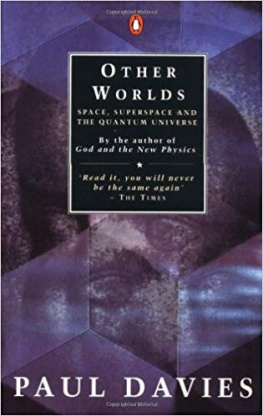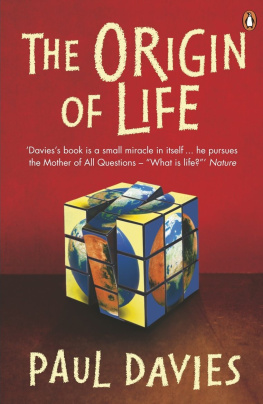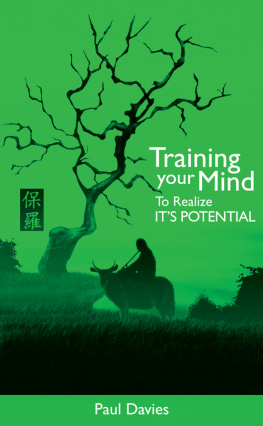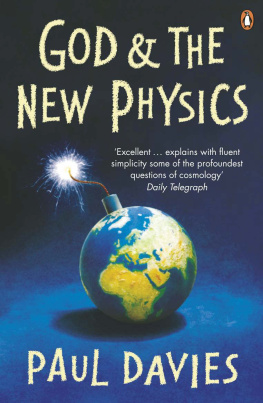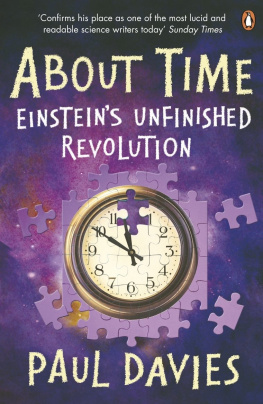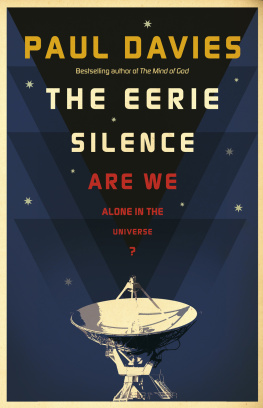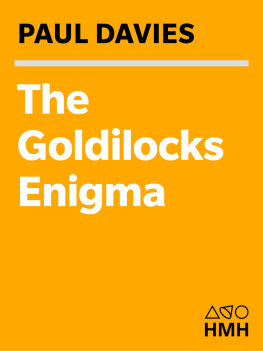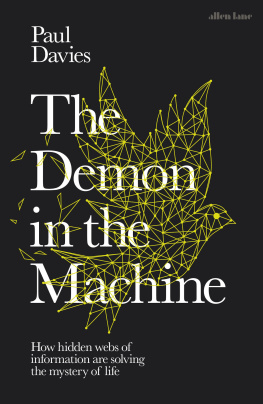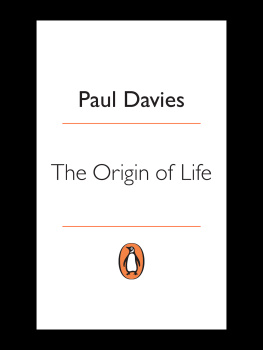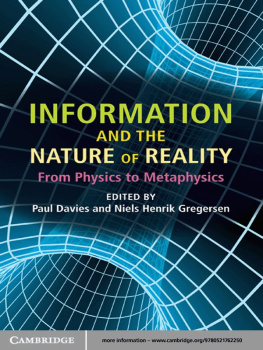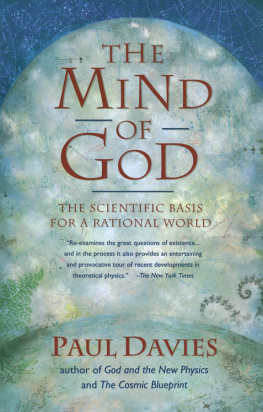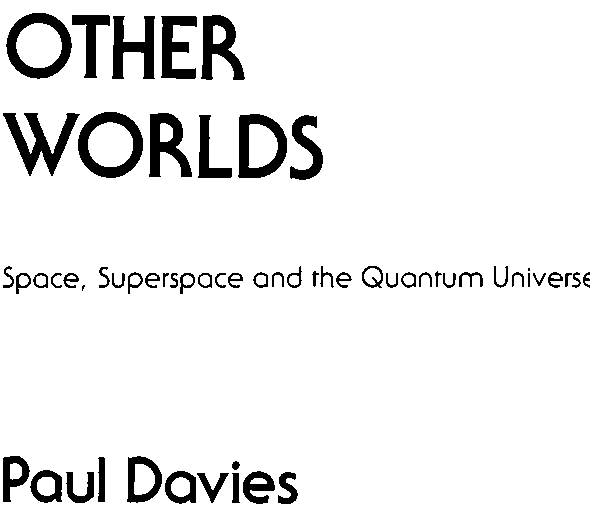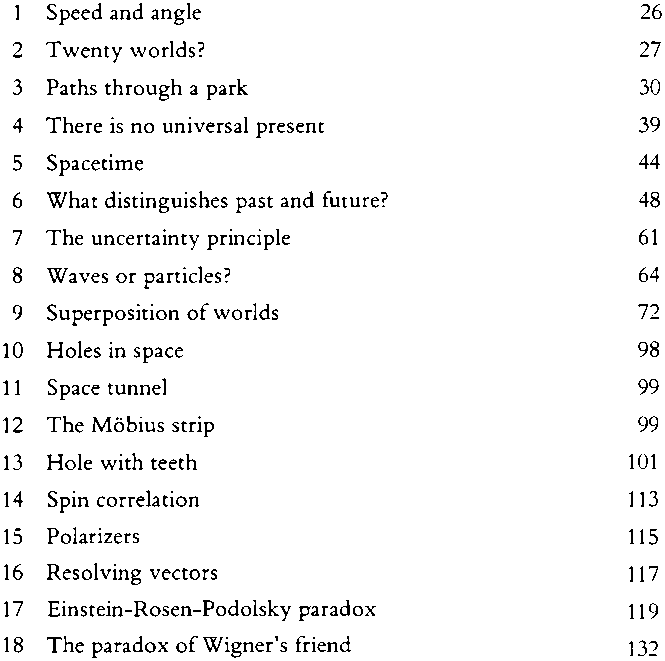| Other Worlds |
| Paul Davies |
| Libre Dionysia (1980) |
|
| Tags: | Non-Fiction, Science |
| Non-Fictionttt Sciencettt |
Paul Davies explains the significance of the amazing quantum universe, where fact is stranger than any science fiction. He takes us into a world where commonsense notions of space, time, and causality must be left behind as the realm of solid matter dissolves into vibrating patterns of ghostly energy, and where mind and matter are interwoven in a subtle and holistic manner. An Australian physicist and author of GOD AND THE NEW PHYSICS, Davies writes for the lay reader in simple language. **
A TOUCHSTONE BOOK
Published by Simon and Schuster
NEW YORK
Copyright & 1980 by Paul Davies
All rights reserved
including the right of reproduction
in whole or in part in any form
First Touchstone Edition, 1982
Published by Simon & Schuster, Inc.
Simon & Schuster Building
Rockefeller Center
1230 Avenue of the Americas
New York, New York 10020
TOUCHSTONE and colophon are registered trademarks of Simon Schuster, Inc.
Manufactured in the United States of America
Originally published in England
by I. M. Dent & Sons Ltd.
1 2 3 4 5 6 7 8 9 10
4 5 6 7 8 9 10Pbk.
Library of Congress Cataloging in Publication Data
Davies, P C W Other worlds.
Includes index.
L Quantum theory. 2. PhysicsPhilosophy.
3. Cosmology. 4. Outer space. I. Title.
QC174.12.D37 1980 530.T2 80-23466
ISBN 0-671-42227-8
ISBN 0-671-42232-4 Pbk.
Illustrations
Preface
Although the word quantum has now entered popular vocabulary, few people are aware of the revolution that has taken place in science and philosophy since the inception of the quantum theory of matter at the beginning of the century. The stunning success of this theory in explaining molecular, atomic, nuclear and subatomic particle processes often obscures the fact that the theory itself is based on principles which are so astonishing that their full implications are often not appreciated, even by many professional scientists.
In this book I have tried to face squarely the full impact of fundamental quantum theory on our conception of the world. The behaviour of subatomic matter is so alien to our commonsense perspective of nature that a description of quantum phenomena reads like something from Alice in Wonderland . The purpose of the present book, however, is not simply to review a notoriously difficult branch of modern physics, but to turn instead to broader issues. What is man? What is the nature of reality? Is the universe we inhabit a random accident or the outcome of a delicate selection process?
The question of why the cosmos has the particular structure and organization that we observe has long intrigued theologians. In recent years, discoveries in fundamental physics and cosmology have opened up the prospect of a scientific approach to some of these questions. Quantum theory has taught us that the world is a game of chance, and we are among the players; that other universes could have been selected, and may even exist in parallel with our own, or in remote regions of spacetime.
The reader need have no previous knowledge of science or philosophy. Although many of the topics treated here require some mental gymnastics, I have tried to explain each new detail from scratch in the most elementary language. If some of the ideas seem hard to believe, it is testimony to the profound changes in the scientific view of the world that have accompanied the great progress of the last few decades.
By way of acknowledgment I would like to say that I have enjoyed fruitful discussions with Dr N. D. Birrell, Dr L. H. Ford, Dr W. G. Unruh and Professor J. A. Wheeler on much of the subject-matter treated here.
Prologuethe unnoticed revolution
Scientific revolutions tend to be associated with a major restructuring of human perspectives. Copernicus claim that the Earth did not occupy the centre of the universe began a disintegration of religious dogma that tore Europe apart; Darwins theory of evolution upset centuries of belief in the special biological status of humans; Hubbles discovery that the Milky Way is but one among billions of galaxies scattered throughout an expanding universe opened up new vistas of celestial immensity. It is therefore remarkable that the greatest scientific revolution of all time has gone largely unnoticed by the general public, not because its implications are uninteresting, but because they are so shattering as to be almost beyond belief- even to the scientific revolutionaries themselves.
The revolution concerned took place between 1900 and 1930, but over forty years later controversy still rages over precisely what it is that has been discovered. Known broadly as the quantum theory it began with an attempt to explain certain technical aspects of subatomic physics. Since then it has grown to incorporate most of modern microphysics, from elementary particles to lasers, and nobody seriously doubts that the theory is correct. What is at issue are the extraordinary consequences that follow if the theory is taken at face value. If accepted completely literally, it leads to the conclusion that the world of our experience - the universe that we actually perceive - is not the only universe. Coexisting alongside it are countless billions of others, some almost identical to ours, others wildly different, inhabited by myriads of near carbon- copies of ourselves in a gigantic, multifoliate reality of parallel worlds.
To avoid this startling spectre of cosmic schizophrenia, the theory can be interpreted more subtly, though its consequences are no less mind-boggling. It has been argued that the other universes are not real, but only contenders for reality - failed alternative worlds. However, they cannot be ignored for it is central to the quantum theory, and can be checked experimentally, that the alternative worlds are not always completely disconnected from our own: they overlap our perceived universe and jostle its atoms. Whether they are only ghost worlds, or as real and concrete as our own, our universe is actually only an infinitesimal slice from a gigantic stack of cosmic images - a superspace. The coming chapters will explain what this superspace is, how it works, and where we, the inhabitants of super-space, fit in.
Science, it is usually believed, helps us to build a picture of objective reality-the world out there. With the advent of the quantum theory, that very reality appears to have crumbled, to be replaced by something so revolutionary and bizarre that its consequences have not yet been properly faced. As we shall see, one can either accept the multiple reality of the parallel worlds, or deny that a real world exists at all, independently of our perception of it. Laboratory experiments performed in the last few years have demonstrated that atoms and subatomic particles, which people usually envisage as microscopic things , are not really things at all, in the sense of having a well-defined, independent existence and a separate, personal identity. Yet we are all made of atoms: the world about us seems to be directed inevitably to an identity crisis.
In the mid-1960s a remarkable mathematical formula was discovered by the physicist John Bell. Any logical theory based on the independent reality of subatomic particles which adheres to the well-established principle that faster-than-light signalling is impossible obeys this formula. Quantum theory on the other hand does not. Recent experiments in which pairs of photons (particles of light) are sent simultaneously through two pieces of polarized material set obliquely to one another confirm that Bells formula is indeed violated.

